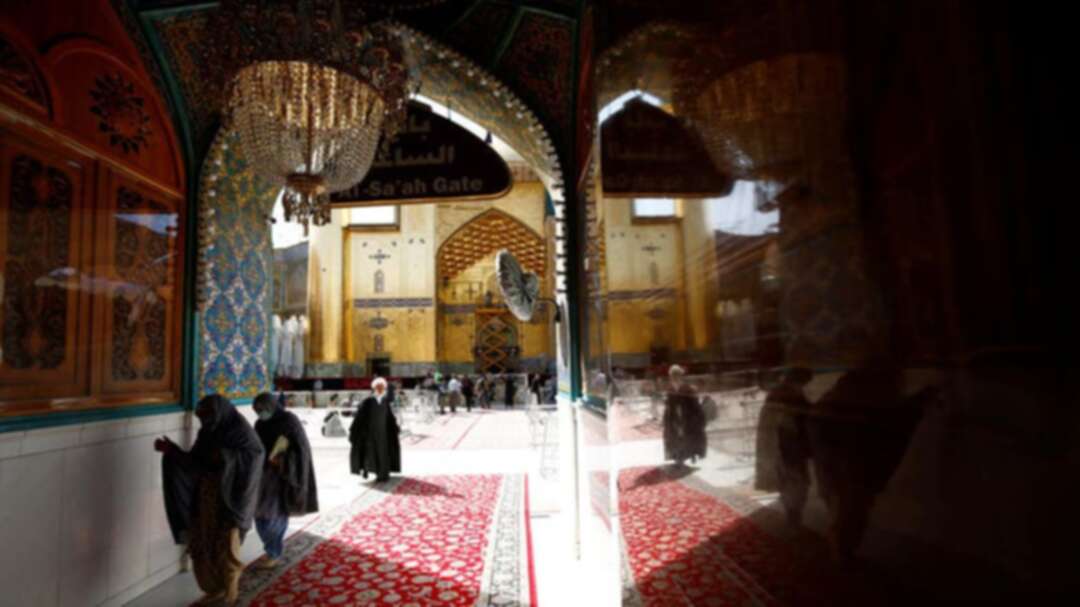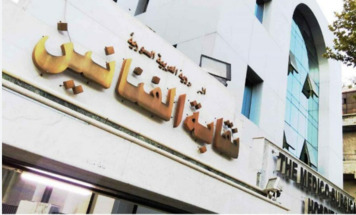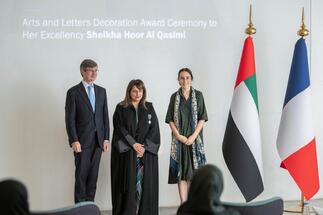-
Coronavirus and protests wreak havoc on Iraq's Shia pilgrimage industry

Iraqi hotel manager Badr al-Jilawi needs to think for a moment to remember when the last guest checked in to visit the holy Shia Muslim city of Najaf, once a prime destination for millions of pilgrims.
With the coronavirus spreading, authorities have banned foreign pilgrims, paralyzing an industry already crippled by anti-government protests and an economic crisis in Shia Iran, usually the source of five million pilgrims annually.
Check out our dedicated coronavirus site here.
Hotels stand empty in Najaf, home to the Iman Ali shrine, and neighboring Kerbela, site of the Imam Hussein shrine - two of the holiest of the Shia world. Souvenir shops and restaurants are also counting their losses.
“Business has stopped. We haven't had one single visitor for around six months, maybe some five Iraqis came but no foreigner,” he said. “Unemployment has jumped (in Najaf).”
He has laid off all but three of his 40 staff to hold the fort with him in the sparsely lit reception.
In total about 4,000 people working in the hospitality sector have lost their jobs in Najaf as the occupancy rate at the 350 hotels and their 40,000 beds is practically “zero”, said Saib Radhi Abu Ghanem, head of the local hotel and restaurant association.
His last guest came in October when anti-government protests broke out and roads were blocked. News that 500 protesters had been killed scared off many pilgrims from Iran, the Gulf, Pakistan, Lebanon, and other countries home to Shias.
More unemployment could fuel the protests, which are driven by complaints by many Iraqis about corruption, mismanagement and the lack of basic services despite Iraq's oil wealth.
Iraqi pilgrims still come but often only for day trips, benefitting the economy little. Many shops in the narrow streets clustered around the shrine have closed and those still open have little to do.
“Najaf has always been a harbor for pilgrims but now I have very little work,” said Omar Saadoun, a tailor selling religious garments.
He has been running his one-room shop for 40 years but business has been rarely as bad as now, not even under Sunni dictator Saddam Hussein, toppled by the 2003 US-led invasion, who used to suppress Shias.
Crisis
Tourism is a key industry not just in Najaf but also in Kerbela, Baghdad and Samarra, home to other Shia places of worshipping.
More than ten million arrived annually alone in Najaf, half of them Iranians, and hotels were usually booked at this time of the year when some Gulf countries have school breaks, said Abu Ghanem.
Pilgrimage tourism has been in trouble for years due to an economic crisis in Iran, where the currency crashed in 2018 due to US sanctions.
The crisis is worsened by a political void in Iraq. Caretaker Prime Minister Adel Abdul Mahdi, who quit in November over the unrest, walked away on Monday, a day after his designated successor, Mohammed Allawi, also left amid political infighting.
“This is a second coronavirus, that there is no state, no prime minister,” said Jilani. “I have monthly costs of $10,000 for electricity, taxes, water. We should get waivers.”
One hotel still has a business, the five-star Qasr Aldur where some 120 of its 420 rooms are occupied by Kuwaiti pilgrims, who stay here until their embassy has figured out how to bring them back. A doctor keeps checking on them.
“There are no flights anymore so we don't know when we can go home,” said Mohamed Jasser, a Kuwaiti pilgrim.
Once they are gone the hotel owner, Nuri Nur also thinks of closing up and send his 60 mask-wearing staff home.
“I might close in a week or so,” said Nur.
Authorities check on the health of non-resident travelers at roadblocks to Najaf and Kerbala, and the latter has canceled Friday prayers for the first time since 2003.
Many pilgrims were still undeterred, with few wearing masks and many kissing the Imam Ali shrine, a Shia tradition.
“I have been here more than a thousand times,” said 67-year old pilgrim Said al-Mussawi, head of a group from the southern city of Basra. “God is protecting us so why should I be afraid?”
source: Reuters
You May Also Like
Popular Posts
Caricature
BENEFIT Sponsors Gulf Uni...
- April 17, 2025
BENEFIT, the Kingdom’s innovator and leading company in Fintech and electronic financial transactions service, has announced its sponsorship of the “Innovation and Sustainable Technology Solutions Competition (GU - IST Solutions), hosted by Gulf University at its main campus.
This strategic sponsorship reflects BENEFIT’s active role in advancing technological innovation and fostering sustainable solutions to future challenges. It also seeks to empower Bahraini youth by enhancing their skills, capabilities, and competitiveness in innovation and solution development—contributing meaningfully to the broader goals of sustainable development across all sectors.
As part of BENEFIT’s active involvement in the competition, the company has announced that Hanan Abdulla Hasan, Senior Manager of Public Relations and Communication, will serve on the competition’s supervisory committee. Her upcoming participation reflects BENEFIT’s forward-looking commitment to championing academic and professional excellence.
Commenting on the occasion, Hanan Abdulla Hasan, Senior Manager of Public Relations and Communication at BENEFIT, said, “We are privileged to support this pioneering initiative, which aligns seamlessly with BENEFIT’s enduring commitment to fostering innovation and nurturing the potential of Bahrain’s youth. Our participation is rooted in a deep sense of social responsibility and a firm belief in the pivotal role of innovation in shaping a sustainable future. Through such platforms, we seek to empower the next generation with the knowledge, skills, and foresight required to develop impactful solutions that address future challenges, in line with the United Nations Sustainable Development Goals 2030.”
Dr. Aseel Al Ayash Dean of the College of Engineering in Gulf University commented, “We extend our sincere gratitude to BENEFIT for their generous sponsorship and support of the Innovation and Sustainable Technology Solutions Competition. This contribution plays an instrumental role in helping us achieve the strategic goals of this initiative, namely, cultivating a culture of innovation and sustainability, encouraging efforts that address the imperatives of sustainable development, and enhancing the practical and professional capabilities of our students and participants.”
The event will bring together a diverse spectrum of participants, including secondary school students, university undergraduates, engineers, industry professionals, entrepreneurs, academic researchers, and subject matter experts representing a wide range of disciplines.
The competition seeks to inspire participants to develop and present innovative, sustainable technologies aimed at addressing pressing environmental, social, and economic challenges. It encourages the formulation of business models that integrate advanced technological solutions with core principles of sustainability. Moreover, it serves as a platform for emerging leaders, entrepreneurs, and innovators to contribute to the advancement of the Sustainable Development Goals, promote the ethos of responsible technology, and demonstrate its transformative potential across various sectors.
Attendees will have the opportunity to view a series of project presentations submitted by participants, covering diverse areas such as eco-friendly product design, smart and sustainable innovations, renewable energy technologies, water conservation and management, waste minimisation and recycling, green architectural solutions, and sustainable transportation systems. Outstanding projects will be formally recognised and awarded at the conclusion of the event.
opinion
Report
ads
Newsletter
Subscribe to our mailing list to get the new updates!






















